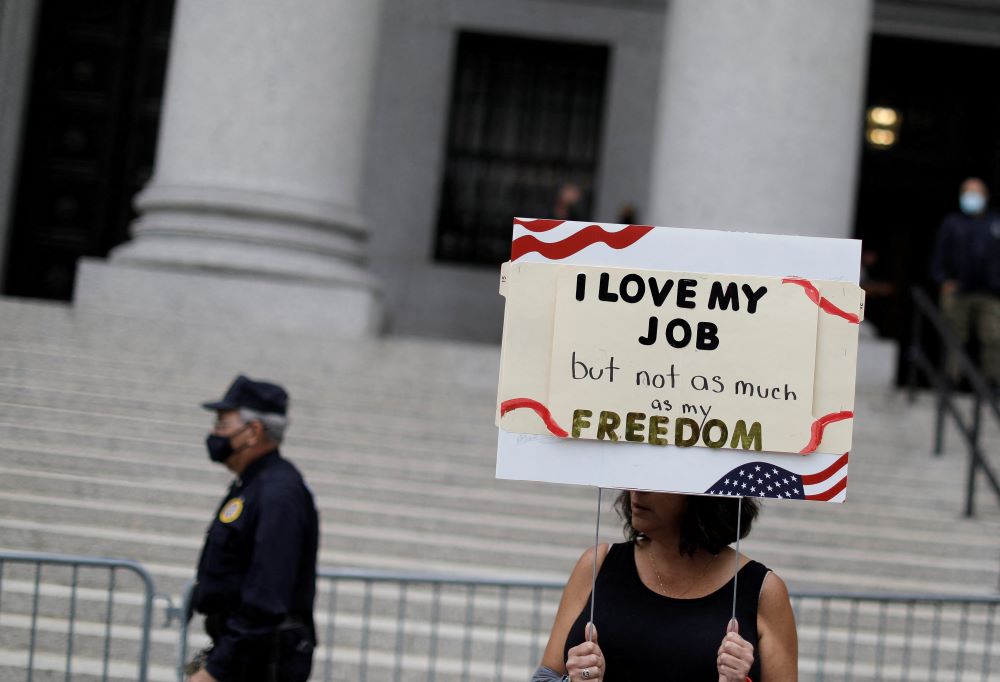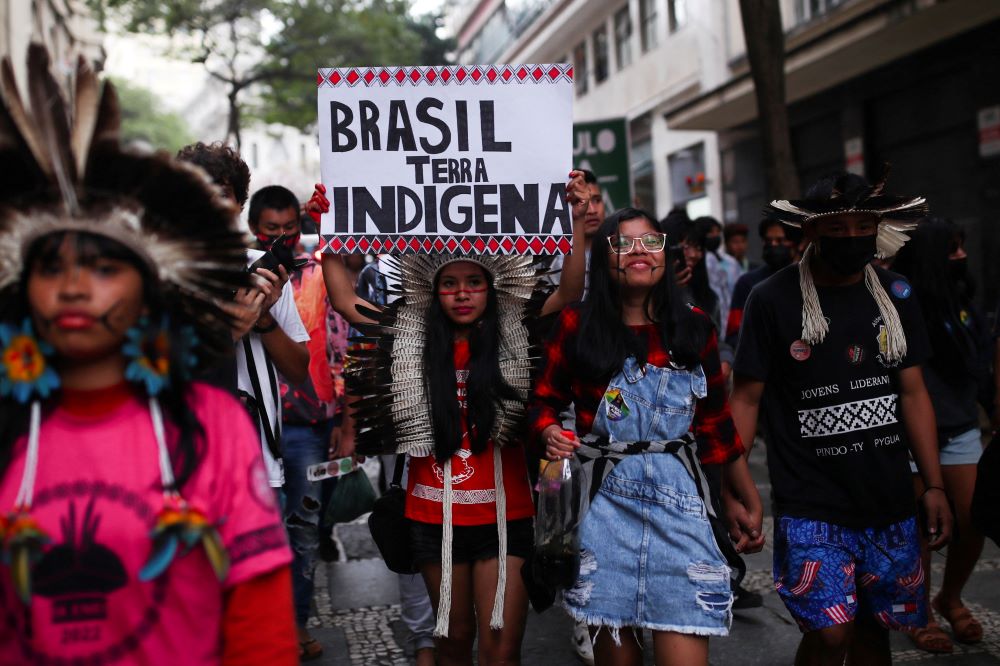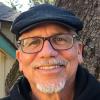
A woman in New York City holds a sign Oct. 12, 2021, during a protest over the city's COVID-19 vaccine mandate. "Freedom" has been subverted to refer to individual rights to the detriment of the common good, writes Daryl Grigsby. (CNS/Reuters/Mike Segar)
The perversion of language is one of the most unsettling components of our current social and political discourse. Expressions and meanings have been turned upside down and inside out.
"Freedom" has been subverted to refer to individual rights to the detriment of the common good. "Science" has been characterized as a tool of the elite to bamboozle unsuspecting masses into such acts as caring for our common home or protecting public health. "The flag" and "The Bible" have been so corrupted by belligerent calls for exclusion and intolerance that many who love the flag and Bible are forced to apologize for their faith and nation.
"Woke" is one of the more intriguing terms. It is referred to with derision, ridicule, and mockery. States and governors proclaim themselves "woke free." But being woke is a fundamentally Catholic and, I would argue, a fundamentally Christian, perspective. In one of Jesus' final discourses to his disciples, Jesus urges them, and us, to "be watchful" (Mark 13: 23, 33, 37).
The bishops at the Second Vatican Council spoke similarly in Gaudium et spes, the Pastoral Constitution on the Church in the Modern World. They wrote,
[T]he Church has always had the duty of scrutinizing the signs of the times and of interpreting them in the light of the Gospel. Thus, in language intelligible to each generation, she can respond to the perennial questions which men ask about this present life and the life to come, and about the relationship of the one to the other.
Later the bishops asserted,
The People of God … labor to decipher authentic signs of God's presence and purpose in the happenings, needs and desires in which this People has a part along with other men of our age. For faith throws a new light on everything, manifests God's design for man's total vocation, and thus directs the mind to solutions which are fully human.
Jesus' admonitions in Mark are not simply for us to be "awake." We are to be aware and busy doing the work God has commissioned us to do. In Mark 13, Jesus' narrative about staying awake refers to servants, each with their "own work" (Mark 13:34). Staying awake is not merely the opposite of sleeping — it implies we are engaged, aware and busy with our vocation and calling. The bishops urged the same, as in Gaudium et spes, they remind the People of God that our discernment of God's presence is followed by work toward the "full ideal God has set for humanity."
'Woke,' or not, is a distraction from the serious business of co-creating God's reign in an unjust, broken and hurting world.
I suggest we end all discussion and debate about being "woke" or not — and apply our God-given energies to the important task of making the Good News a reality in our world. "Woke," or not, is a distraction from the serious business of co-creating God's reign in an unjust, broken and hurting world. All biblical writings on human accountability do not refer to abstractions, rather, they refer to our actual deeds on behalf of, or, to the detriment of, God's human and natural creation.
Jesuit Fr. Jon Sobrino's book, Theology wthout Deception: God, The Poor and Reality in El Salvador Theology, continues this theme. He notes that his comfortable perspectives were upended with the "irruption" of encountering the poor in El Salvador. He notes that their hurts, illnesses, injustices and repression awakened him "as from a dream." Sobrino remembered that philosopher Immanuel Kant admonished that "One must awaken from the dogmatic sleep." Sobrino also quoted 16th-century Dominican Fr. Antonio Montesinos, one of the first to condemn the enslavement of Africans and the oppression of Indigenous peoples. According to Sobrino, Montesinos preached, "Wake Up. Before the horrors of our world do not remain in lethargic slumber asleep."

Indigenous people march with a sign that says "Brazil Indigenous Land" as they mark the International Day of the World's Indigenous Peoples in São Paulo Aug. 9, 2022. Sixteenth-century Dominican Fr. Antonio Montesinos was one of the first to condemn the enslavement of Africans and the oppression of Indigenous peoples.(CNS/Reuters/Amanda Perobelli)
Montesino's words are appropriate for us today. The horrors of the world are enough to overwhelm and paralyze. Opiate addictions; gun proliferation; mental illness; child poverty; sex trafficking; domestic violence; rape; war in Ukraine, South Sudan and elsewhere; violence in Haiti; calls for border walls; massive nuclear buildups; white nationalism; anti-LGTBQ words and deeds; and many other "horrors" are realities of our daily lives.
Yet, Jesus and the bishops of the world have asked that we not only face these truths, but find the signs of God's desire for us, and act to make those desires a reality. The Scriptures tell us that God is love, that all humanity, and all nature, was created by God. We also know from the Old Testament, the New Testament, history and our current reality, that injustice and evil are constant features of human life.
Our task is not easy: to face with courage all that is wrong in the world, and respond not with disillusionment but with open eyes, an open heart, a discerning mind, and working hands and feet. The critical question then is not are we "woke," but what is our work, and are we up and doing it?
Advertisement
So much of Scripture speaks of "good works." These sometimes get a bad name as some erroneously accuse others of trying to "earn" God's favor and work their way to heaven. Yet, Jesus is clear, when we light our light, we don't hide it under a bushel basket, but put it on a lamp stand. There, Jesus says, "it gives light to all in the house" (Matthew 5:15). A light for those in the darkness of tragedy and evil is surely not just words, but deeds that make a difference, and in the words of Gaudium et spes, "makes known the full ideal God has set for humanity."
When the liturgical year ends on the last Sunday in Ordinary Time, this year the feast of Christ the King includes the Gospel according to Matthew, Chapter 25. There we will hear that Jesus will have "all nations assembled before him." The Gospel reading notes that Jesus will say to those on the right, "Come, you who are blessed." They will be invited to God's kingdom because of their active care for other humans.
Jesus uses many verbs to describe their lives and vocations — "gave, welcomed, clothed, visited, cared for." Those verbs are the behaviors of those who are alert, awake, discerning and acting on God's desires for human flourishing. The Jesus who ended his pilgrimage on earth saying "take this … this is my body, given for you" has called us to join him in the work to bring light and Good News to all humanity.







